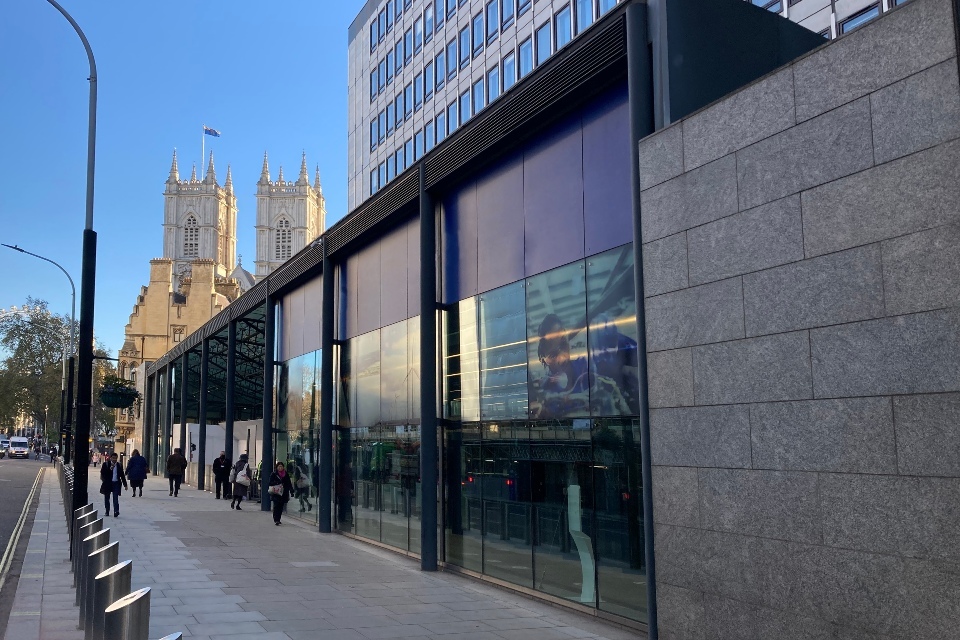- The government has launched five new Quantum Missions, building on UK’s £2.5 billion Quantum Strategy
- missions aim to galvanise academics, industry and private investors to commit time and resource towards hitting significant milestones, like embedding quantum sensing into the NHS
- new Science Minister Andrew Griffith makes first visit to National Physical Laboratory, to see new Advanced Quantum Metrology Lab
Science Minister Andrew Griffith made his first ministerial visit yesterday (Thursday 23 November) to the National Physical Laboratory and its new state-of-the-art lab. The visit marks the launch of five new Quantum Missions aimed at securing the UK’s status as a world leader in the technology, by setting clear milestones for inward investment and research in areas like computing, healthcare and navigation.
On Wednesday, (22 November) the Chancellor launched the five new Quantum Missions as part of the Autumn Statement, with the stated aim of galvanising academics, industry and private investors to commit time and resource towards achieving specific key milestones over the next decade and a half.
With the biggest impacts for quantum technologies expected in the long-term, these Missions will help crystallize the activity and investment needed in the public and private sectors to achieve ambitious milestones for this technology. The advent of quantum technology could see faster and more successful financial modelling that reduces risk for businesses, new sensors detecting cancers and other diseases more quickly and the creation of batteries far more efficient than ever before.
The Missions, backed by our £2.5 billion Quantum Strategy, are:
- By 2035, there will be accessible, UK-based quantum computers capable of running 1 trillion operations and supporting applications that provide benefits well in excess of classical supercomputers across key sectors of the economy.
- By 2035, the UK will have deployed the world’s most advanced quantum network at scale, pioneering the future quantum internet.
- By 2030, every NHS Trust will benefit from quantum sensing-enabled solutions, helping those with chronic illness live healthier, longer lives through early diagnosis and treatment.
- By 2030, quantum navigation systems, including clocks, will be deployed on aircraft, providing next-generation accuracy for resilience that is independent of satellite signals.
- By 2030, mobile, networked quantum sensors will have unlocked new situational awareness capabilities, exploited across critical infrastructure in the transport, telecoms, energy, and defence sectors.
The Science Minister visited the National Physical Laboratory in Teddington, home to their Advanced Quantum Metrology Lab, a new, state-of-the-art facility used for the test and evaluation of clocks, which provides super-accurate timing that researchers and companies can access to test their own technology and validate their research.
On the visit the Minister met with some of the leading quantum scientists and engineers in the country, as well as toured the state-of-the-art facilities, including those which provide the UK’s own exact time, as well as a 3 metres tall quantum refrigerator that is colder than deep space.
Minister Griffith was appointed as Science Minister last week following a sterling career in the City of London and recently serving as City Minister within the Treasury.
The Minister will leverage this experience to ensure the UK’s burgeoning science sector can secure both the domestic and foreign investment it needs to build scalable industries of tomorrow, including quantum technologies.
Minister of State for Science, Research and Innovation, Minister Andrew Griffith said:
Quantum technology has the potential to revolutionise the way modern economies work through an exponential increase in processing speed and power.
I want to ensure the UK is in a position to be one of the first and biggest beneficiaries of this game-changing technology, which is why we are investing £2.5 billion in quantum over the next ten years, and launching these Quantum Missions to focus the minds of investors and researchers on the key concrete steps we can take.
The announcement of the Five Quantum Missions at the Autumn Statement comes alongside further support for UK compute, including an investment of £500 million into using compute for artificial intelligence (AI), spread over two years.
Quantum technologies – one of the government’s five critical technologies – are devices and systems using quantum mechanics to provide capabilities that ‘classical’ machines like binary computers cannot. They could bring enormous benefits to the economy, such as making it possible to solve complex problems impossible to solve with even the most powerful high-performance classical computers, and opening entirely new frontiers in sensing, timing, imaging, and communications.
Dr Peter Thompson, CEO, National Physical Laboratory (NPL) said:
Our science and engineering facilities at National Physical Laboratory (NPL), which the Minister has seen today, are directly contributing to the realisation of the Quantum Missions. The significant investments at NPL in quantum, focus on ensuring that the UK sees the benefits to our economic prosperity, national security, and wellbeing.
Innovative UK companies of all sizes are working with us to test their quantum technologies’, leading to greater investment and scale up, and accelerating both their ability to get technologies to market quicker, and to trade more effectively.
The National Quantum Strategy, published in March 2023, commits a further £2.5 billion to developing quantum technologies in the UK over the ten years from 2024 which will aim to generate at least an additional £1 billion of private investment into the programme.
This announcement comes off the back of continued support for the sector from the government. In October, Science and Technology Michelle Donelan opened PsiQuantum’s new state-of-the-art research and development (R&D) facility at Sci-Tech Daresbury, which is supported with £9 million from the Government. In June, Minister Freeman announced £45 million in funding to support universities and businesses working in the UK’s quantum technologies sector.







